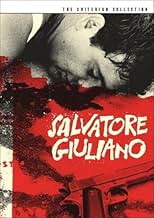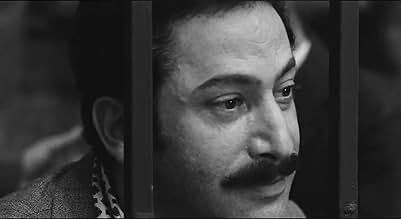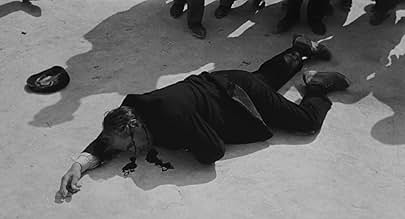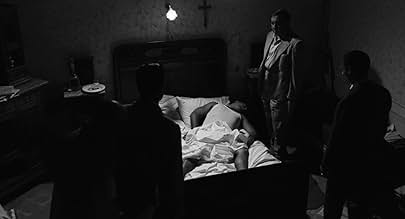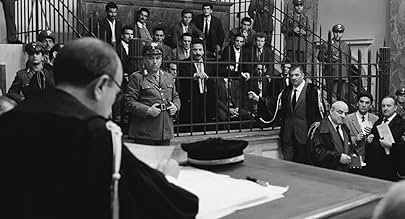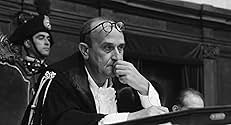IMDb-BEWERTUNG
7,3/10
5275
IHRE BEWERTUNG
Die undurchsichtigen und komplizierten Wendungen zwischen der Staatsgewalt, der Unabhängigkeitspartei und der Mafia im Sizilien der 40er-Jahre gipfelt im Tod von Salvatore Giuliano.Die undurchsichtigen und komplizierten Wendungen zwischen der Staatsgewalt, der Unabhängigkeitspartei und der Mafia im Sizilien der 40er-Jahre gipfelt im Tod von Salvatore Giuliano.Die undurchsichtigen und komplizierten Wendungen zwischen der Staatsgewalt, der Unabhängigkeitspartei und der Mafia im Sizilien der 40er-Jahre gipfelt im Tod von Salvatore Giuliano.
- Auszeichnungen
- 6 Gewinne & 4 Nominierungen insgesamt
Frederico Zardi
- Pisciotta's Defense Counsel
- (Nicht genannt)
Pippo Agusta
- Minor Role
- (Nicht genannt)
Sennuccio Benelli
- Reporter
- (Nicht genannt)
Giuseppe Calandra
- Minor Official
- (Nicht genannt)
Pietro Cammarata
- Salvatore Giuliano
- (Nicht genannt)
Max Cartier
- Francesco
- (Nicht genannt)
Nando Cicero
- Bandit
- (Nicht genannt)
Pietro Franzone
- Seperatist
- (Nicht genannt)
Giovanni Gallina
- Bit Part
- (Nicht genannt)
Vincenzo Norvese
- Bit Part
- (Nicht genannt)
Carmelo Oliviero
- Don Nitto Minasola
- (Nicht genannt)
Renato Pinciroli
- Pinciroli
- (Nicht genannt)
Francesco Rosi
- Narrator
- (Synchronisation)
- (Nicht genannt)
Giuseppe Teti
- Priest of Montelepre
- (Nicht genannt)
Cosimo Torino
- Frank Mannino
- (Nicht genannt)
Empfohlene Bewertungen
This remarkable movie reminded me of early Eisenstein for the fluid, dynamic
movement of crowds--in the streets, in the movement of soldiers and bandits across the hilly terrain, and in the scene of the Portella della Ginestre massacre. The back-and-forth narrative structure must have influenced Costa-Gavras in the making of "Z." And Rosi's ability to get riveting performances from non-professionals (some of whom could not read scripts) is astonishing. The story line gets confusing, but I think that's because the situation was confusing--multiple betrayals and layers of
corruption and complicity--rather than a flaw in the script or editing. Visually exciting, too--the use of distancing overhead shots, the quiet menace of gunmen walking up a deserted, sun-baked street... memorable stuff.
movement of crowds--in the streets, in the movement of soldiers and bandits across the hilly terrain, and in the scene of the Portella della Ginestre massacre. The back-and-forth narrative structure must have influenced Costa-Gavras in the making of "Z." And Rosi's ability to get riveting performances from non-professionals (some of whom could not read scripts) is astonishing. The story line gets confusing, but I think that's because the situation was confusing--multiple betrayals and layers of
corruption and complicity--rather than a flaw in the script or editing. Visually exciting, too--the use of distancing overhead shots, the quiet menace of gunmen walking up a deserted, sun-baked street... memorable stuff.
A perfect analysis of the most famous gangster, loved from the poor people, of Sicily. Is very good the acting of Frank Wolff as the cousin of Giuliano, Salvatore Pisciotta. On this Film there is the same history of the gangster of the Film "Il Siciliano" with C. Lambert, but here the film is history, there the film is a bad novel.
Filmed in the actual Siciilian locations, this film is a fair attempt to strip away the myth surrounding bandit-cum-revolutionary Giuliano. In fact, he doesn't appear except as a gunned-down corpse at the beginning. The film winds back to unravel the events leading to his death, and forwards to its consequence. This is a clever method of achieving objectivity while at the same time subtly emphasising the man's elusive and mysterious qualities. To show Giuliano would have either been either hagiography or iconoclasm. The film rose above that and broadened its inquiry into the wider social and political context, effectively belittling him as the puppet of various forces jostling for position in Sicily after the war: bandits, police, local aristocracy, the Italian government, communists, and the Mafia.
This sets quite a challenge for itself, partly because of the vacuum at its centre, partly because of the obscurity and complexity of the real events. We are delivered to a chaotic courtroom to try to piece it together. The film finally latches onto Giuliano's lieutenant the only one who seems to know something of what is going on - but even he is silenced. It's all the more disturbing for the confusion.
Rosi is one of the best directors of crowds scenes and he gives raucous energy to any gathering of men, especially in the courtroom. He induces a kind of group hysteria in his actors; they are totally unaware of the camera and the result is an almost disturbing hyper-real feel (real crowds are dull in comparison) it's really something to appreciate. To get into this film, you need to invest something in the passions of the various parties involved - if not sympathise with them, then at least understand them. Without this, the danger is that it all boils down to so much petty bickering. The same might be said of the Godfather, which clearly owes a huge debt to Rosi's style.
Influential then, somewhat brave, with some fine directorial moments, and an interesting history lesson. Hard to actually like, but hard not to admire.
This sets quite a challenge for itself, partly because of the vacuum at its centre, partly because of the obscurity and complexity of the real events. We are delivered to a chaotic courtroom to try to piece it together. The film finally latches onto Giuliano's lieutenant the only one who seems to know something of what is going on - but even he is silenced. It's all the more disturbing for the confusion.
Rosi is one of the best directors of crowds scenes and he gives raucous energy to any gathering of men, especially in the courtroom. He induces a kind of group hysteria in his actors; they are totally unaware of the camera and the result is an almost disturbing hyper-real feel (real crowds are dull in comparison) it's really something to appreciate. To get into this film, you need to invest something in the passions of the various parties involved - if not sympathise with them, then at least understand them. Without this, the danger is that it all boils down to so much petty bickering. The same might be said of the Godfather, which clearly owes a huge debt to Rosi's style.
Influential then, somewhat brave, with some fine directorial moments, and an interesting history lesson. Hard to actually like, but hard not to admire.
Through the first hour of this film there are no focused characters, at most a character is seen in two or three short scenes. It's basically just following history and showing examples of it. Luckily it's not rushed, it's decently paced and it is realistic.
The best way to describe this is to call it a docu-drama. A narrator tells you something and then some people either do what's described or continues where the narrator leaves off. Though this approach can work, I did find it distancing in this film and it did make me less interested. The above competent direction and photography did elevate it however and for a long time I felt that it was great.
The films main problem is that we never really get to know anything, least of all about the title character who is despite the entire film being about his history only seen dead, or walking/running around. He only has a few lines.
Then towards the middle we experience two horrendous acts of overacting which damages the film severely. Both involving screaming/crying, the worst offender was the woman playing Giulianos mother. She screams and cries so awfully and in such a high tone that you wonder if you are watching a cheap parody. This scene is agonizingly long.
We do however learn a lot about the conflict going on and after a bit more than an hour, perhaps closer to 90 mins we get one character to follow. Overall I just don't think the film put us inside the conflict and despite giving us historical facts and let us understand the events we never got to the core. This made it cold and somewhat uninteresting for time to time. Not a film I would recommend but definitely a more or less good film.
6.5/10
The best way to describe this is to call it a docu-drama. A narrator tells you something and then some people either do what's described or continues where the narrator leaves off. Though this approach can work, I did find it distancing in this film and it did make me less interested. The above competent direction and photography did elevate it however and for a long time I felt that it was great.
The films main problem is that we never really get to know anything, least of all about the title character who is despite the entire film being about his history only seen dead, or walking/running around. He only has a few lines.
Then towards the middle we experience two horrendous acts of overacting which damages the film severely. Both involving screaming/crying, the worst offender was the woman playing Giulianos mother. She screams and cries so awfully and in such a high tone that you wonder if you are watching a cheap parody. This scene is agonizingly long.
We do however learn a lot about the conflict going on and after a bit more than an hour, perhaps closer to 90 mins we get one character to follow. Overall I just don't think the film put us inside the conflict and despite giving us historical facts and let us understand the events we never got to the core. This made it cold and somewhat uninteresting for time to time. Not a film I would recommend but definitely a more or less good film.
6.5/10
Review of Salvatore Giuliano (1962)
Directed by Francesco Rosi, Salvatore Giuliano (1962) is a gripping, politically charged Italian film that blends the genres of crime drama and historical reconstruction. The film portrays the life and death of Salvatore Giuliano, a real-life Sicilian bandit who became a legendary figure in post-war Italy. Giuliano's story is tragic, marked by his transformation from a rebellious hero to a notorious outlaw and his eventual murder under mysterious circumstances.
Rosi's approach to the material is unique. The film doesn't rely on a traditional narrative structure but instead unfolds in a fragmented, almost documentary-like fashion, presenting the story from various perspectives. This method of storytelling creates a sense of disorientation, mirroring the confusion and corruption of the political and social forces at play in post-WWII Sicily. By juxtaposing the personal tragedy of Giuliano with the larger political landscape of Italy, the film reveals the complex intersections between crime, politics, and the Sicilian mafia.
The performances are strong, with a particularly noteworthy portrayal of Giuliano by Marcello Mastroianni, whose quiet intensity brings depth to a character that is both a symbol of resistance and a product of the violent environment in which he lives. Rosi's direction maintains a cold, observational tone, which works well to emphasize the film's themes of disillusionment and betrayal.
Visually, the film is stunning, with cinematography that captures the stark beauty of the Sicilian landscape while also reflecting the harsh realities of life for the people caught in the web of organized crime and political corruption. The stark black-and-white visuals, coupled with the atmospheric score by Francesco De Masi, enhance the film's somber and tense mood.
Salvatore Giuliano is an excellent example of the political cinema that emerged in Italy during the post-neorealist era. It's not just a crime story; it's an exploration of the corruption and disillusionment that permeated Italian society during the 1940s and '50s. While the film might feel slow or fragmented at times, its depth and ambition make it a fascinating and insightful watch for those interested in the intersection of politics, history, and cinema.
Rating: 4/5 - A thought-provoking, well-crafted historical drama that shines a light on the murky intersection of crime and politics in post-war Sicily.
Directed by Francesco Rosi, Salvatore Giuliano (1962) is a gripping, politically charged Italian film that blends the genres of crime drama and historical reconstruction. The film portrays the life and death of Salvatore Giuliano, a real-life Sicilian bandit who became a legendary figure in post-war Italy. Giuliano's story is tragic, marked by his transformation from a rebellious hero to a notorious outlaw and his eventual murder under mysterious circumstances.
Rosi's approach to the material is unique. The film doesn't rely on a traditional narrative structure but instead unfolds in a fragmented, almost documentary-like fashion, presenting the story from various perspectives. This method of storytelling creates a sense of disorientation, mirroring the confusion and corruption of the political and social forces at play in post-WWII Sicily. By juxtaposing the personal tragedy of Giuliano with the larger political landscape of Italy, the film reveals the complex intersections between crime, politics, and the Sicilian mafia.
The performances are strong, with a particularly noteworthy portrayal of Giuliano by Marcello Mastroianni, whose quiet intensity brings depth to a character that is both a symbol of resistance and a product of the violent environment in which he lives. Rosi's direction maintains a cold, observational tone, which works well to emphasize the film's themes of disillusionment and betrayal.
Visually, the film is stunning, with cinematography that captures the stark beauty of the Sicilian landscape while also reflecting the harsh realities of life for the people caught in the web of organized crime and political corruption. The stark black-and-white visuals, coupled with the atmospheric score by Francesco De Masi, enhance the film's somber and tense mood.
Salvatore Giuliano is an excellent example of the political cinema that emerged in Italy during the post-neorealist era. It's not just a crime story; it's an exploration of the corruption and disillusionment that permeated Italian society during the 1940s and '50s. While the film might feel slow or fragmented at times, its depth and ambition make it a fascinating and insightful watch for those interested in the intersection of politics, history, and cinema.
Rating: 4/5 - A thought-provoking, well-crafted historical drama that shines a light on the murky intersection of crime and politics in post-war Sicily.
Wusstest du schon
- WissenswertesMartin Scorsese credits this film as being one of his many inspirational sources for the look and style of his Taxi Driver (1976).
- PatzerWhen his mother comes to view and identify his corpse, Salvatore's stomach clearly moves as the actor struggles to control his breathing.
- VerbindungenEdited into Il sasso in bocca (1970)
Top-Auswahl
Melde dich zum Bewerten an und greife auf die Watchlist für personalisierte Empfehlungen zu.
- How long is Salvatore Giuliano?Powered by Alexa
Details
- Erscheinungsdatum
- Herkunftsland
- Sprache
- Auch bekannt als
- Salvatore Giuliano
- Drehorte
- 98 Via Serafino Mannone, Castelvetrano, Trapani, Sicily, Italien(Giuliano's body)
- Produktionsfirmen
- Weitere beteiligte Unternehmen bei IMDbPro anzeigen
- Laufzeit2 Stunden 3 Minuten
- Farbe
- Sound-Mix
- Seitenverhältnis
- 1.85 : 1
Zu dieser Seite beitragen
Bearbeitung vorschlagen oder fehlenden Inhalt hinzufügen

Oberste Lücke
By what name was Wer erschoß Salvatore G.? (1962) officially released in Canada in English?
Antwort
